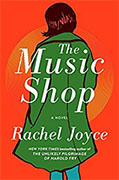The Music Shop
Rachel Joyce
book reviews:
· general fiction
· chick lit/romance
· sci-fi/fantasy
· graphic novels
· nonfiction
· audio books
· author interviews
· children's books @
curledupkids.com
· DVD reviews @
curledupdvd.com
newsletter
win books
buy online
links
home
for authors
& publishers
for reviewers

 |
The Music Shop Rachel Joyce Random House Hardcover 320 pages January 2018 |
|
To this reviewer and writer, the most important aspects of a successful, fulfilling novel are well-delineated, somewhat unusual characters, at least some of whom are empathetic; a colorful, well-detailed sense of place; and, of course, a narrative that seems possible. I am not discussing fantasy or sci-fi here, as these are not genres I often read. Instead, I enjoy reading of people and places I would like to know, ones that seem realistic, even exotic or delightful.
The music shop is at the heart of the novel. In Frank’s “cram-packed” shop are thousands of records and quite a few turntables. Customers are welcome to come in and listen, talk, and buy if wanted. If they don’t know what they are looking for, after speaking to them for a while, Frank is able to tell them the music they will like and that they need. The second primary character is Ilse, a mysterious German woman supposedly engaged to be married but not as attached as one would expect. When she wanders into the music shop, Frank recommends what he feels is appropriate music to this sad woman. They agree on Vivaldi’s Four Seasons, and Frank tells Ilse a lot about the composer. Unbeknownst to him, the beautiful German woman was a famous violinist who had to stop playing because of an arthritic-type illness. “my knuckles began to swell. It was awful… I wanted to be great. I didn’t want to be… normal.” After Ilsa comes into the shop, she finds herself almost inadvertently going back. Eventually, after many discussions about music, Frank and Ilsa begin spending time together--drinking tea, taking walks and boat rides in the nearby park. Frank, in his 40s, has never had a love relationship and is amazed that this could still occur in his life. Voila, romance arrives. But then, rather abruptly, it leaves. Other characters thread their way through the narrative, including Father Anthony,who runs a small gift shop, and Maude, who runs a tatoo parlor. All are quirky and distinctive; all love Unity Street. The shop row’s vendors become quite a community; the Music Shop is at their center. Frank is an amazing, one-of-a-kind character. His musical tastes and intuition about people are uncanny. He recommends classical, religious, country-western, pop--all musical genres, often in combination, say Janis Joplin and Mozart. The customer takes the records home, and eventually her life changes bit by bit. Frank’s judgment seems never to flounder. However, the neighborhood begins to flounder. Developers have big plans to gentrify the area. Many of the small shops on Unity Street, including a bakery and an undertaker’s office, close, leaving Frank’s shop one of a very few still open. When a huge disaster strikes his store, Frank’s life changes radically. The neighborhood becomes more seedy; the street becomes less safe. Frank becomes depressed and lonely and is forced to take work he cares nothing for--for a while. Ilse disappears. Not entirely surprisingly, after the dissolution of the neighborhood, some of the original community continues to be of primary importance to Frank. I never give away the ending and in this case, not even near the ending, as so much happens in the last 50 pages. Suffice it to say, the novel has a quite happy ending, but long time-lapses between significant moments are somewhat unexplained. Nevertheless, the characters and their eccentric personalities and lives keep this reader turning the pages. The Music Shop Rachel Joyce’s first novel, The Unlikely Pilgrimage of Harold Fry, was short-listed for the Commonwealth Book Prize and longlisted for the Man Booker Prize. Originally published on Curled Up With A Good Book at www.curledup.com. © Deborah Straw, 2018 |
|
|
|
 Click here to learn more about this month's sponsor! |
|
| fiction · sf/f · comic books · nonfiction · audio newsletter · free book contest · buy books online review index · links · · authors & publishers reviewers |
|
| site by ELBO Computing Resources, Inc. | |
 Such are the characters in this second novel by British writer Rachel Joyce,
Such are the characters in this second novel by British writer Rachel Joyce,